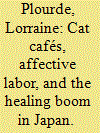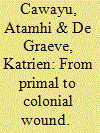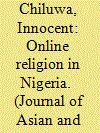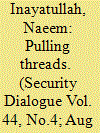|
|
|
Sort Order |
|
|
|
Items / Page
|
|
|
|
|
|
|
| Srl | Item |
| 1 |
ID:
133422


|
|
|
|
|
| Publication |
2014.
|
| Summary/Abstract |
This article examines the Japanese cat café boom, which peaked in 2009 yet remains a significant retail phenomenon throughout Japan, and in particular Tokyo. How do humans encounter animals in contemporary Japan, not as private owners and companions, but as consumers seeking direct, sensory engagement with cats at a moment of profound social and economic anxieties? Drawing on ethnographic fieldwork conducted in Tokyo, this article examines how cats have become a newly emergent commodity within the 'healing boom' that first emerged in recessionary-era 1990s Japan. Such healing commodities - therapeutic music, aromatherapy, robot interaction, among others - are designed to invoke an affective engagement with the consumer in order to cope with the uncertain and stressful conditions of life in still recessionary, and now post 3/11, Japan. I situate cat cafés within the increasing immaterialization of the economy in post-bubble Japan during which social relationships have become commodified and marketed to those who can afford it. Cats are the affective object through which patrons seek a sense of healing and relaxation.
|
|
|
|
|
|
|
|
|
|
|
|
|
|
|
|
| 2 |
ID:
134354


|
|
|
|
|
| Summary/Abstract |
This paper employs functionalist, transformative and peacebuilding approaches to explore the role played by civil society in peacebuilding during Zimbabwe's coalition government (2009–2013), under the Church and Civil Society Forum (CCSF). Through the functions of democratisation, socialisation and the rebuilding of communities, the various bottom-up peacebuilding initiatives under the CCSF framework rebuilt broken relationships, provided spaces of encounter between victims and perpetrators, and bridged the paradoxical values of mercy, justice, truth and peace in a context of deep political polarisation. Although the various peacebuilding activities were scattered and sporadic, they do provide a basis for nationwide replication under a ZANU-PF dominated government. The new 2013 constitution provides institutional opportunities for the formulation of a broader national framework for peacebuilding that synergises these efforts by civil society and a politically willing state.
|
|
|
|
|
|
|
|
|
|
|
|
|
|
|
|
| 3 |
ID:
187069


|
|
|
|
|
| Summary/Abstract |
This paper provides a critical analysis of the narratives of Bolivian adoptees in Belgium. We discuss how the adoptees look back upon the imagery of family and culture invoked by their parents and wider social environment and how this imagery has affected their sense of self and belonging. We argue that the adoptees’ narratives testify of a discursive struggle to reclaim control over their lives and histories. While they draw upon prevailing discourses that tend to imagine adoptees as ‘wounded’, they do so in diverse, complex and at times contradictory ways. Their perceptions of the familial and cultural imagery show that while they do not entirely reject the idea of being hurt, they seem to make a shift from explaining this ‘wound’ in individual-psychological terms to explaining it in social terms, making use of emerging anti-racist and decolonial perspectives.
|
|
|
|
|
|
|
|
|
|
|
|
|
|
|
|
| 4 |
ID:
115720


|
|
|
|
|
| Publication |
2012.
|
| Summary/Abstract |
This study examines the use of the Internet and computer-mediated communication for Christian worship in Nigeria. The seven largest and fastest growing churches in Nigeria are selected for the study, highlighting the benefits and dangers associated with online worship. The utilization of the Internet to disseminate the Christian message and attract membership across the world, and the dissemination of religious tenets and fellowship online, have resulted in the emergence of the 'Internet church' for members who worship online in addition to belonging to a local church. Most interesting is the increasing widespread claim of spiritual experience or 'miracles' through digital worship. However, there is fear that online worship endangers the offline house fellowship system, which is viewed as the reproductive organ of the local offline church. Exclusive online worshippers are also said to be susceptible to deception and divided loyalty.
|
|
|
|
|
|
|
|
|
|
|
|
|
|
|
|
| 5 |
ID:
106776


|
|
|
|
|
| Publication |
2011.
|
| Summary/Abstract |
This article explores the notions of 'healing' and 'reconciliation' as they are used in the literature on peacebuilding. It argues that these notions are used vaguely and that they are deployed to discriminate between 'bottom-up' and 'top-down' approaches to peacebuilding. As such, they render invisible complex connections between the psycho-social processes associated with healing and the political processes associated with reconciliation. Numerous programmes and processes of peacebuilding are conceived upon the distinction between healing and reconciliation. The article examines the effects of this distinction and argues that where healing and reconciliation are disconnected, peacebuilding produces experiences of secondary victimization that undermine peace. The case of post-genocide Rwanda is used to support this argument.
|
|
|
|
|
|
|
|
|
|
|
|
|
|
|
|
| 6 |
ID:
122651


|
|
|
|
|
| Publication |
2013.
|
| Summary/Abstract |
The achievements of Elizabeth Dauphinee's (2013) The Politics of Exile are highlighted by means of two juxtapositions. First, Dauphinee's book invites a contrast to novels because it takes the form of a story. Specifically, Dauphinee's portrait of the vilified 'Serbs' is compared with how the Taliban are treated in Khalid Hosseini's The Kite Runner and Nadeem Aslam's The Wasted Vigil. Second, The Politics of Exile is examined as it emerges from Dauphinee's efforts to overcome the limits of her more academic work. The advantages of Dauphinee's approach relative to our standard research are presented along five dimensions: the responsibility of closure, the purpose of narration, the transparency of the message, how the work is shown, and the role of generosity. This article critiques Dauphinee's silence on the purpose of travel. It closes by suggesting what social theory can glean from The Politics of Exile. Social theorists can learn how to theorize more systematically, to weigh the relationship between the form and content in writing more judiciously, and to probe the deeper purposes of our intellectual life-work more fully.
|
|
|
|
|
|
|
|
|
|
|
|
|
|
|
|
| 7 |
ID:
080872


|
|
|
|
|
| Publication |
2008.
|
| Summary/Abstract |
This article presents unique material from in-depth interviews with 16 women in Rwanda who have testified in the gacaca, the village tribunals initiated to enhance reconciliation after the 1994 genocide. The aim of the interviews was to learn more about how testifying in such a public event as the gacaca affects psychological health. Do the women find the experience healing or retraumatizing? Are there other effects involved? There has been an assumption that testifying in truth and reconciliation commissions is a healing experience for survivors, and healing has been a central concept in the general reconciliation literature and in political rhetoric around truth commissions. However, the findings of the present study are alarming. Traumatization, ill-health, isolation, and insecurity dominate the lives of these testifying women. They are threatened and harassed before, during, and after giving testimony in the gacaca. The article provides a picture of the reconciliation process that we seldom see
|
|
|
|
|
|
|
|
|
|
|
|
|
|
|
|
|
|
|
|
|